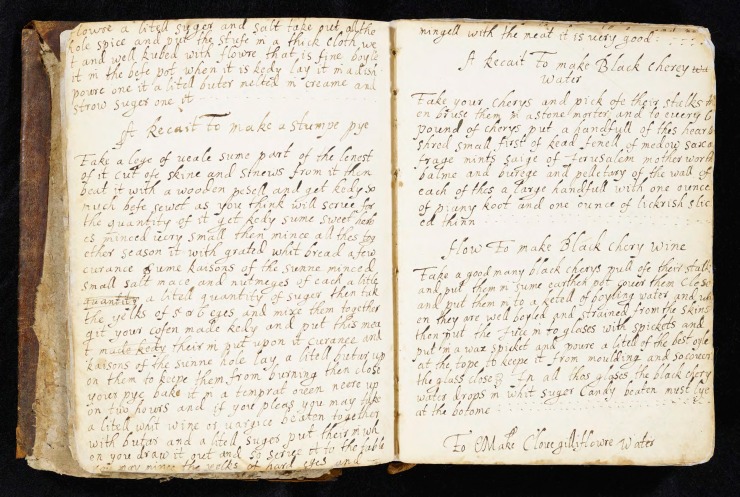
Goal
The goal of this website is to establish the relevance of the Elizabeth Dyke Book of Recaits (1668), an early modern manuscript, to contemporary readers. This website is divided into three major sections designed to appeal to three different audiences: Rhetoric and Composition Scholars and Teachers, Contemporary Cooks and Recipe Practitioners, and Secondary World History Teachers.
It is our goal to demonstrate how these groups might utilize the manuscript in scholarly, pedagogical, and public spheres. A the same time, we also seek to demonstrate the overlap of knowledge production and identities between these audiences, providing links to related pages from the other sections whenever possible. In many ways, the theoretical foundations in the section on “Rhetoric and Composition Scholars/Teachers” form the basis for the utilization of the manuscript in the other two sections.
The research group that produced this website includes two doctoral students and one undergraduate student at the University of Kansas.
Theory
The theoretical foundation of our approach lies in feminist theory and archival practices. We are working from the premise that the archival process is one of power and knowledge production. We acknowledge our influence and participation in this process and seek to undermine the authority of a singular author by working collaboratively on all parts of this website. We provide this introduction to offer insight into our decision-making processes. Our focus that our website may be accessible and useful for a variety of audiences.
Scholarly texts that have influenced our work:
Hirsch, Marianne. “Feminist Archives of Possibility.” Differences: A Journal of Feminist cultural Studies, vol. 29, no. 1, 2018, pp. 173-88.
Schwartz, Joan M. and Terry Cook. “Archives, Records, and Power,” Archival Science 2: 2002, pp 1-19.
Smith, Martha Nell. “The Human Touch Software of the Highest Order: Revisiting Editing as Interpretation.” Textual Cultures: Texts, Contexts, Interpretation, vol. 2, no. 1, 2007, pp. 1-15.
Wernimont, Jacqueline. “Whence Feminism? Assessing Feminist Interventions in Digital Literary Archives.” DHQ: Digital Humanities Quarterly 7, no.1 (2013): 1-23.
Methods
This collaborative project grew out of our work in a blended graduate/undergraduate course in Digital Feminist Archives at the University of Kansas in the fall of 2018. For a portion of this course, all students worked to transcribe the entire Dyke Manuscript. View the course transcription work here: http://www.idrh.dept.ku.edu/digfemarchive/
Our work with the manuscript along with our research led us to ponder the relevance of the manuscript to modern readers. This website offers scholars from various fields, teachers, and contemporary cooks access to the Dyke Manuscript, as well as ways they can implement it.
History of the Manuscript
The early modern manuscript, Elizabeth Dyke’s Booke of Recaits, was written around 1668 in the Sussex region of Britain. It is unclear whether the manuscript was bound as a book before it was written or was compiled afterward. Elizabeth Dyke was a member of a land-holding family who gained their wealth from ironfounding in the Sussex Weald. Elizabeth Dyke appears to have passed her book down through the matriarchal line of her family.
The recipe book includes 725 medicinal and nutritional recipes, which was common for recipe books during this time. The book’s ingredients demonstrate the local agricultural produce as well as Britain’s connection to international trade. Many names of other women are included in the book. It is assumed that these names document who the recipe came from originally. The book can also be examined to explore issues around early modern women’s writing and the role of manuscripts during this era.
The Dyke Manuscript is currently housed at the Kenneth Spencer Research Library on the University of Kansas Campus: https://spencer.lib.ku.edu/
Library catalog entry for the Dyke Manuscript: https://catalog.lib.ku.edu/cgi-bin/Pwebrecon.cgi?bbid=3010304
Contact Us
The creators and contributors to this site include:
- Rachel Trusty – A Ph.D. Student in Women, Gender, and Sexuality Studies. Rachel’s research and art-making focuses on the intersection between Feminist and Queer approaches in relation to art objects and art-making techniques.
racheltrusty@ku.edu - Phoenix Schroeder – Undergraduate student in English and Women, Gender, and Sexuality Studies. Phoenix focuses on institutional rhetorics that keep power out of the hands of marginalized people and works on initiatives to improve campus access for LGBTQIA+ individuals.
- Sarah Polo- Ph.D. Candidate in Rhetoric and Composition at the University of Kansas. Sarah’s research focuses on the history of writing instruction, archival theory and methods within the field of rhetoric and composition, rhetorical genre theory, and women’s and gender studies.
sarahpolo@ku.edu \ polosarah1@gmail.com